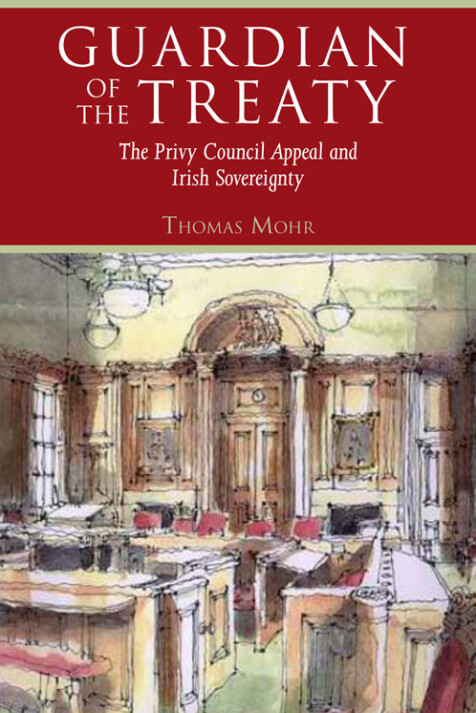Guardian of the Treaty
The Privy Council Appeal and Irish sovereignty
Thomas Mohr
“The book follows a chronological structure which traces the Irish Privy Council appeal throughout its history, from its gestation during Gladstone’s rejected plans for Home Rule, to the impact of the Appeal during its lifespan in the Irish Free State, to its eventual abolition under De Valera’s first Fianna Fáil government in the mid-1930s. It is well presented by Four Courts Press and contains several images which ably compliment the book’s subject matter, such as contemporary political figures discussed by the book and historic and modern-day images of the Privy Council itself. It is particularly significant in situating Irish events within the broader context of Commonwealth developments, noting that the abolition of the Irish Privy Council appeal precipitated the international decline of its influence, with numerous other Commonwealth countries following Ireland’s lead. Overall, in discussing an aspect of the Treaty settlement which has been neglected by modern scholarship, it is an important contribution to our understanding of the Irish Free State”. Gerard Madden, Irish Studies Review, 27:4
‘In this impressive and thoughtful book, Mohr charts the role that the Judicial Committee of the Privy Council played in the Irish Free State from 1922 until the abolition of the Irish Privy Council appeal in 1935 … In Guardian of the Treaty, Mohr has created an accessible and interesting volume that will surely consolidate his status as one of the key figures in Irish constitutional and legal history’, Lord Kerr of Tonaghmore, Supreme Court of the United Kingdom, The Cambridge Law Journal (March 2017).
‘Thomas Mohr’s book is a wide-ranging exploration of how the legal and political conundrum over sovereignty created by article 66 was approached on both sides of the Irish Sea, the tensions that it gave rise to, and how it was ultimately resolved under Irish law and British law … Dr Mohr’s book is the fruit of many years of archival research and study in Ireland, Britain and Canada. It can be warmly recommended’, Daire Hogan, Law Society Gazette (March 2017).
‘Mohr’s Guardian of the Treaty [is] a welcome work … This is a dispassionate and balanced account of an emotive subject. It expands our knowledge of the Privy Council in relation to Ireland rather than challenging existing histories of the Privy Council … The author has made a valuable contribution in expanding our knowledge of the Privy Council, particularly in its handling of the relationship between adjudication and legislation … It deserves a place in any collection of materials on the Privy Council. In providing a comprehensive account of Ireland’s relationship with the Privy Council it provides an important square in what will ultimately come to be the quilt of understanding that displays the Privy Council', Catherine MacMillan, The Irish Jurist (2017).

